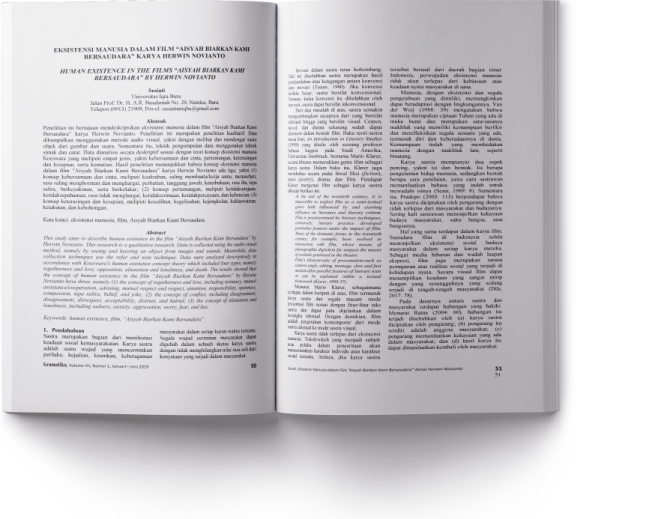HUMAN EXISTENCE IN THE FILMS “AISYAH BIARKAN KAMI BERSAUDARA” BY HERWIN NOVIANTO
Abstract
This study aims to describe human existence in the film “Aisyah Biarkan Kami Bersaudara” by Herwin Novianto. This research is a qualitative research. Data is collected using the audio visual method, namely by seeing and hearing an object from images and sounds. Meanwhile, data collection techniques use the refer and note technique. Data were analyzed descriptively in accordance with Koeswara's human existence concept theory which included four types, namely togetherness and love, opposition, alienation and loneliness, and death. The results showed that the concept of human existence in the film “Aisyah Biarkan Kami Bersaudara” by Herwin Novianto have three, namely (1) the concept of togetherness and love, including intimacy, mutual assistance/cooperation, advising, mutual respect and respect, attention, responsibility, openness, compassion, tepa salira, belief, and joke; (2) the concept of conflict, including disagreement, disagreement, disrespect, acceptability, distrust, and hatred; (3) the concept of alienation and loneliness, including sadness, anxiety, aggravation, worry, fear, and lies.
References
Abidin, Zainal. (2007). Analisis Eksistensial, Sebuah Pendekatan Alternatif untuk Psikologi dan Psikiatri. Jakarta: PT Raja Grafindo.
Bagus, Lorens. (2005). Kamus Filsafat. Jakarta: Gramedia Pustaka Utama.
Dila, Putri Andini Kusumawardani. (2017). “Gambaran Eksistensi Tokoh Sandra dalam Film Deux Jours Une Nuit Karya Jean-Plerre Dardenne dan Luc Dardenne: Kajian Psikologi Eksistensial”. Thesis. Universitas Brawijaya.
Djojosuroto, Kinayati. (2007). Filsafat Bahasa. Yogyakarta: Pustaka Book.
Klarer, Mario. (1998). An Introduction to Literary Studies. London: Routledge.
Koeswara. (2002). Psokologi Eksistensial Suatu Pengantar. Bandung: Rosda Offset.
Moleong, Lexi. (2007). Metodologi Penelitian Kualitatif. Bandung: Remaja Rosdakarya.
Pradopo, Rahmat Djoko. (2003). Prinsip-prinsip Kritik Sastra. Yogyakarta: Gadjah Mada University Press.
Ratna, Nyoman Kutha. (2004). Paradigma Sosiologi Sastra. Yogyakarta: Pustaka Pelajar.
Semi, M. Atar. (1989). Kritik Sastra. Bandung: Angkasa.
Sumarno, Marseli. (1996). Dasar-dasar Apresiasi Film. Jakarta: PT Grasindo.
Tafsir, Ahmad. (2006). Filsafat Pendidikan Islami. Jakarta: PT Remaja Rosdakarya.
Teeuw, A. (1984). Sastra dan Ilmu Sastra: Pengantar Teori Sastra. Jakarta: Pustaka Jaya.
Van der Weij, P. A. (1988). Filsuf-Filsuf Besar tentang Manusia (Terj.: K. Bertens). Gramedia: Jakarta.

Copyright (c) 2019 Susiati Susiati

This work is licensed under a Creative Commons Attribution-NonCommercial-ShareAlike 4.0 International License.


